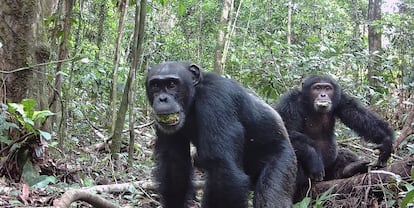The human attraction to alcoholic beverages could be, to a large extent, inherited from our primate ancestors. And in a way, it’s something we share with our closest living relatives: according to a new study published this Wednesday in the scientific journal Science Advances, chimpanzees consume high doses of alcohol daily for their body weight, through the fruit that is part of their regular diet.
A team of biologists from the University of California, Berkeley analyzed more than 500 fruit samples from 20 plant species in the forests of two national parks: Kibale (Uganda) and Taï (Ivory Coast). There, chimpanzees of two different subspecies—the eastern (Pan troglodytes schweinfurthii) and the western (P. t. verus)—eat about 4.5 kilograms of fruit per day, with an average ethanol content of 0.31% to 0.32%. The result: an intake of between 13 and 15 grams of alcohol per day, which for both male and female chimpanzees is comparable to two or three beers for a human.
The researchers argue that these data support the “drunken monkey hypothesis,” proposed more than two decades ago by Robert Dudley, co-author of this new research, according to which the human fascination with alcohol has an evolutionary origin. The natural fermentation of ripe fruit, the theory goes, exposed hominids to small doses of ethanol for millions of years. This exposure may have led to physiological adaptations, such as more efficient enzymes for metabolizing it, but also a behavioral bias.
The study suggests that this common component of primates’ diets may function as an olfactory cue, associating the smell of alcohol with energy-dense foods. It may also act as a feeding stimulant. According to the researchers, the psychoactive effect of alcohol could lead them to eat more food when they consume it.
Robert Dudley emphasizes that 85% of what chimpanzees eat is ripe fruit, a diet that naturally exposes them to the alcohol generated by fermentation: “At first, we thought there would be some ethanol in everything they ate, but we didn’t know how much. Our hypothesis was that, even though each fruit had a small amount, they ate so much fruit that they would actually consume a lot of alcohol during the day.” The beginnings of the drunken monkey theory date back to 2000: “I had predicted it many years ago, but it took me a long time to go to Africa and do all these studies,” Dudley now says.
This professor of integrative biology at Berkeley explains that the recently published research is the result of a five-year project in the African rainforest, characterized by a climate warm and humid enough to support fruit year-round. But the team also found clues in species that inhabit Latin America: “We’ve conducted these types of measurements in Panama on spider monkey consumption. We know this is also a very likely outcome for primates on the American continent,” Dudley notes.
 Researchers analyzed more than 500 fruit samples from 20 plant species in the rainforests of Uganda and the Ivory Coast.Aleksey MaroDo chimpanzees get drunk?
Researchers analyzed more than 500 fruit samples from 20 plant species in the rainforests of Uganda and the Ivory Coast.Aleksey MaroDo chimpanzees get drunk?
The first archaeological evidence of human-controlled fermentation dates back 9,000 and 13,000 years, in China and the Middle East, respectively. According to the primatologist Fernando Colmenares, the relevance of the research lies in its connection with a behavior that persists in our species. “As indicated in the article, chimpanzees are our closest living relatives, and I find this work interesting for reflecting on the precursors of what we see in humans today,” notes the researcher.
Specialists insist on the importance of linking the dose to its physiological and behavioral effects. While chimpanzees’ ethanol consumption thresholds have been identified, insufficient detail has been given on how these factors translate into their behavior: “It is not yet known whether the amount of alcohol could cause them to behave in a particular way, similar to the behavior of a human when drinking,” notes Colmenares, one of the founders of the Spanish Primatological Association.
According to Dudley, the lack of any obvious change in chimpanzees’ behavior is due to a simple fact: they always consume alcohol with fruit. “They eat and drink at the same time, but in low concentrations. Then their stomachs fill up before they can reach the level that would make a human drunk or appear drunk.”
It remains to be seen whether chimpanzees consciously select fruits with higher alcohol content or prefer those with lower fermentation rates. However, for Dudley, the underlying conclusion is unequivocal: “Alcohol is part of our inherited diet, and we are attracted to it because it provides an energetic advantage. It’s simply a natural response.”
Sign up for our weekly newsletter to get more English-language news coverage from EL PAÍS USA Edition
